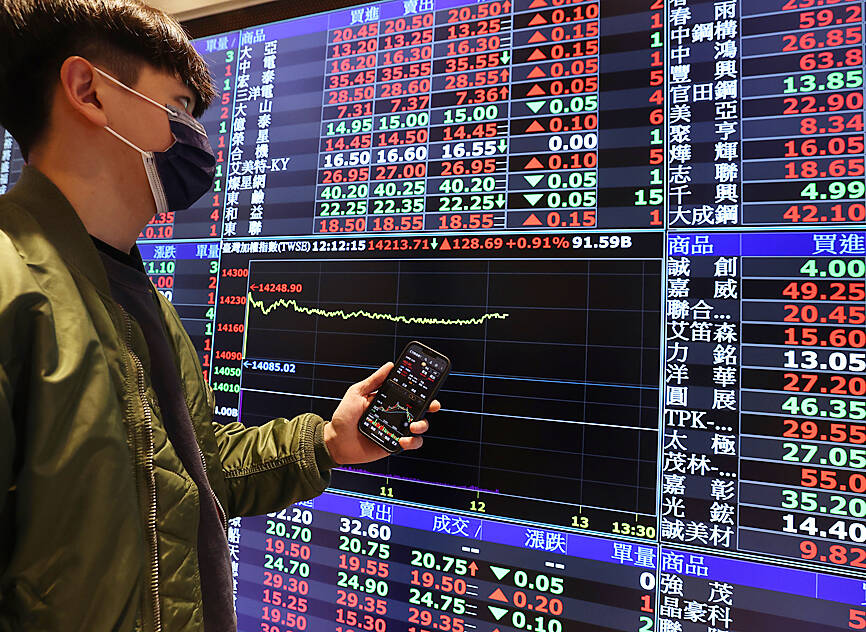Investors might take heart from the latest twist in the presidential race, as a tie-up of opposition candidates raises the odds of a more China-friendly government taking post next year.
The benchmark TAIEX rose on Wednesday and the New Taiwan dollar advanced, as traders digested the announcement that the Chinese Nationalist Party (KMT) and the Taiwan People’s Party (TPP) would put forward a united candidate. That came as a relief for some who have been worried about a potential deterioration in cross-strait relations should Vice President William Lai (賴清德), the Democratic Progressive Party’s (DPP) presidential candidate, who has consistently led opinion polls, win.
Geopolitical risks have been an overhang over Taiwanese equities for years, with investors fretting over the possibility of a military conflict between Taipei and Beijing. While the TAIEX has rallied more than 20 percent this year as an artificial intelligence (AI) boom buoyed chip giants, foreigners are on track for a fourth straight year of outflows.

Photo: CNA
“It gives us a sense of temporary relief on the election uncertainty,” said Xiadong Bao, a fund manager at Edmond de Rothschild Asset Management in Paris. “The alliance raises the potential for further dialogues to improve cross-strait relations.”
Voters going to the polls on Jan. 13 are to choose between a ruling party determined to maintain Taiwan’s sovereignty, and an opposition that sees closer ties with China as the only viable path. The outcome would define Taipei’s relations with Beijing in the years to come, while also setting the tone for US-China tensions.
Then-US House of Representatives speaker Nancy Pelosi’s visit to Taipei in August last year raised angst in financial markets, as Beijing ratcheted up military drills around Taiwan in a show of warning. The TAIEX fell 1.6 percent in the session before Pelosi met President Tsai Ing-wen (蔡英文), but posted small gains on the day.
“Taiwan market volatility tended to rise in the six months leading up to the presidential elections,” Goldman Sachs Group Inc strategists including Alvin So (蘇瑋忠) wrote in a note. “Taiwan equities have shown greater performance in the three months following a KMT victory, while underperforming significantly after a DPP victory.”
While the election remains a key focus, the Taiwanese market is also affected by an array of factors, including the US monetary policy, as well as semiconductor and AI cycles.
A potential dovish pivot by the US Federal Reserve might drive more inflows into emerging markets, with such expectation on full display on Wednesday following a softer-than-expected US inflation report.
The local currency on Wednesday rose the most since July after sliding more than 4 percent this year, hammered by a large rate differential with the US and equity outflows. The TAIEX closed up 1.3 percent.
Wednesday’s announcement by the opposition “should be broadly positive for Taiwanese and Chinese assets, especially when considered in conjunction with improving US-China relations,” said Rory Green, China economist at TS Lombard.
Sectors most exposed to cross-strait trade, including semiconductor companies, agriculture producers and tourism-related firms stand to benefit, he added.

Taiwan will prioritize the development of silicon photonics by taking advantage of its strength in the semiconductor industry to build another shield to protect the local economy, National Development Council (NDC) Minister Paul Liu (劉鏡清) said yesterday. Speaking at a meeting of the legislature’s Economics Committee, Liu said Taiwan already has the artificial intelligence (AI) industry as a shield, after the semiconductor industry, to safeguard the country, and is looking at new unique fields to build more economic shields. While Taiwan will further strengthen its existing shields, over the longer term, the country is determined to focus on such potential segments as

UNCERTAINTY: Innolux activated a stringent supply chain management mechanism, as it did during the COVID-19 pandemic, to ensure optimal inventory levels for customers Flat-panel display makers AUO Corp (友達) and Innolux Corp (群創) yesterday said that about 12 to 20 percent of their display business is at risk of potential US tariffs and that they would relocate production or shipment destinations to mitigate the levies’ effects. US tariffs would have a direct impact of US$200 million on AUO’s revenue, company chairman Paul Peng (彭雙浪) told reporters on the sidelines of the Touch Taiwan trade show in Taipei yesterday. That would make up about 12 percent of the company’s overall revenue. To cope with the tariff uncertainty, AUO plans to allocate its production to manufacturing facilities in

COLLABORATION: Given Taiwan’s key position in global supply chains, the US firm is discussing strategies with local partners and clients to deal with global uncertainties Advanced Micro Devices Inc (AMD) yesterday said it is meeting with local ecosystem partners, including Taiwan Semiconductor Manufacturing Co (TSMC, 台積電), to discuss strategies, including long-term manufacturing, to navigate uncertainties such as US tariffs, as Taiwan occupies an important position in global supply chains. AMD chief executive officer Lisa Su (蘇姿丰) told reporters that Taiwan is an important part of the chip designer’s ecosystem and she is discussing with partners and customers in Taiwan to forge strong collaborations on different areas during this critical period. AMD has just become the first artificial-intelligence (AI) server chip customer of TSMC to utilize its advanced

Chizuko Kimura has become the first female sushi chef in the world to win a Michelin star, fulfilling a promise she made to her dying husband to continue his legacy. The 54-year-old Japanese chef regained the Michelin star her late husband, Shunei Kimura, won three years ago for their Sushi Shunei restaurant in Paris. For Shunei Kimura, the star was a dream come true. However, the joy was short-lived. He died from cancer just three months later in June 2022. He was 65. The following year, the restaurant in the heart of Montmartre lost its star rating. Chizuko Kimura insisted that the new star is still down